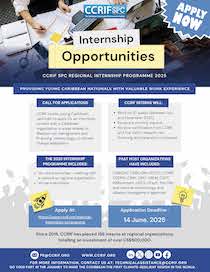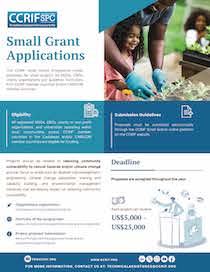
September 19, 2023. Grand Cayman, Cayman Islands. Water utilities in the Caribbean will now be able to access parametric insurance1 coverage through CCRIF SPC (formerly the Caribbean Catastrophe Risk Insurance Facility) to financially protect them against extreme weather events such as hurricanes, tropical storms, and excess rainfall events. The Caribbean Water Utility Insurance Collective (CWUIC) has been established as a segregated portfolio (SP)2 within CCRIF. CCRIF is the world’s first multi-country, multi-peril risk pool providing parametric insurance and offers products to 19 Caribbean governments, 4 Central American governments and 3 Caribbean electric utilities. CCRIF offers 5 parametric insurance products: for tropical cyclones, excess rainfall, earthquakes, for the fisheries sector and the electric utilities sector for transmission and distribution. The water utilities product will be CCRIF’s 6th parametric insurance product on offer.
CWUIC SP has been in the making for the last two years, with the Inter-American Development Bank (IDB) providing technical and financial support for the structuring of CWUIC, and CCRIF undertaking the modelling work to develop the insurance model that will underpin the water utilities insurance product and allow CWUIC to provide insurance coverage to water utilities. Other key partners in this initiative are the UK Foreign, Commonwealth and Development Office (FCDO), and the Caribbean Development Bank (CDB). A total of US$8.45M of grant resources has been mobilized for CWUIC SP. This includes US$7.8M from the IDB, of which US$5.6M was provided by the UK Government through the FCDO to support technical assistance to finalize the structuring of CWUIC SP and provide premium subsidies for the insurance coverage to water utilities in 6 Caribbean countries. CDB has approved grant funds of US$650,000 in technical assistance.
FCDO has also provided development aid to CCRIF, in the amount of US$25M, to capitalize CWUIC SP. This will be used in combination with reinsurance to protect CWUIC SP against unexpected losses from policy claims. This US$25 million facility provided by FCDO to CCRIF is interest-free with repayment after a 20-year period.
According to CCRIF CEO, Isaac Anthony, “CWUIC benefits from CCRIF’s 16-year experience of offering parametric insurance policies to provide coverage against natural hazards to governments as well as Caribbean electric utility companies. With CWUIC, CCRIF continues to leverage its state-of-the-art parametric insurance base models – tropical cyclone and excess rainfall – to produce models and products for key economic sectors that are usually not able to access affordable insurance coverage against natural hazards”.
Approximately 35 water utilities in 29 territories in the Caribbean have been identified as potential clients for CWUIC SP. The vision for CWUIC goes beyond insurance. CWUIC has been designed as a centre of excellence for disaster risk management and financing for water utilities and has 3 components:
-
Support to water utilities in emergency response planning and restoring and rebuilding post-disaster.
-
Parametric insurance to help water utilities to respond to and recover from natural disasters.
-
Provision of advisory services and technical assistance to identify and structure priority projects to build water and wastewater utilities’ resilience to natural hazards. Under this component, the IDB received US$500,000 from the Coca-Cola Foundation to conduct
feasibility studies on water utility projects that promote resilience.
UK Minister for the Americas and Caribbean David Rutley said, “The people of the Caribbean are on the frontline of natural disasters, which are increasing in frequency due to climate change. This first-of-its-kind scheme will enable Caribbean countries to maintain essential services in the face of storms and floods, while greatly reducing the financial burden on individual governments. The UK is determined to play its part in helping small island developing states build resilience to extreme weather events with access to fairer and reliable funding.”
The story of the Caribbean region’s vulnerability to hydro-meteorological hazards such as hurricanes, tropical storms and excess rainfall is well known, and the impacts of these events are being exacerbated by climate change, which is increasing their frequency and intensity. Following natural disasters, the infrastructure and equipment of water utilities, such as pumping stations and intake valves may be significantly impacted and/or destroyed, often due to the high levels of turbidity and accompanying flooding. Water utilities across the region have limited financial resources and oftentimes are unable to recover in a timely manner to provide safe drinking water and sanitation services following natural disasters. The importance of potable water following a natural disaster cannot be emphasized enough and is key to avoiding the incidence of water-borne diseases which are often associated with these natural disaster events.
CDB’s Vice President of Operations, Isaac Solomon said, “The story of CWUIC SP’s development is one of donor collaboration in response to an expressed demand from utilities and endorsed by regional governments. CDB has been an integral part of the Working Group that designed and established CWUIC SP, acknowledging that the water utilities in all our Borrowing Member Countries (BMCs) should have access to this facility. For this reason, CDB has committed additional resources to extend the analytical work required to provide coverage to all BMC water utilities. CDB believes that CWUIC SP is uniquely positioned to change the lives of Caribbean people by enabling water utilities to maintain business continuity following a natural disaster – a time when the role of water becomes critical to clean-up efforts, healthcare and basic human needs.”
Access to quick liquidity following a natural disaster will be key for water utilities as this will ensure that they will be able to restore water supply in the shortest possible time. In fact, several years ago, a payout to one of CCRIF’s members in the Eastern Caribbean under their tropical cyclone insurance policy was used to quickly repair that country’s main water treatment plant which was a feeder for other plants on that island. A dedicated disaster risk financing and management facility for the water and wastewater sector will bring immeasurable benefits and dedicated resources for water utilities to respond to their most pressing needs following a natural disaster. CCRIF is committed to providing payouts within 14 days after a member’s policy is triggered, and since its inception in 2007, CCRIF has made 60 payouts totalling US$261.8 million to 16 of its member governments.
About CCRIF SPC:
CCRIF SPC is a segregated portfolio company, owned, operated and registered in the Caribbean. It limits the financial impact of catastrophic hurricanes, earthquakes and excess rainfall events to Caribbean and Central American governments by quickly providing short-term liquidity when a parametric insurance policy is triggered. It is the world’s first regional fund utilising parametric insurance, giving member governments the unique opportunity to purchase earthquake, hurricane and excess rainfall catastrophe coverage with lowest possible pricing. CCRIF was developed under the technical leadership of the World Bank and with a grant from the Government of Japan. It was capitalized through contributions to a Multi-Donor Trust Fund (MDTF) by the Government of Canada, the European Union, the World Bank, the governments of the UK and France, the Caribbean Development Bank and the governments of Ireland and Bermuda, as well as through membership fees paid by participating governments. In 2014, a second MDTF was established by the World Bank to support the development of CCRIF SPC’s new products for current and potential members and facilitate the entry of Central American countries and additional Caribbean countries. The MDTF currently channels funds from various donors, including Canada, through Global Affairs Canada; the United States, through the Department of the Treasury; the European Union, through the European Commission, and Germany, through the Federal Ministry for Economic Cooperation and Development (BMZ) and KfW. Additional financing has been provided by the Caribbean Development Bank, with resources provided by Mexico; the Government of Ireland; and the European Union through its Regional Resilience Building Facility managed by the Global Facility for Disaster Reduction and Recovery (GFDRR) and the World Bank.
About the Caribbean Development Bank (CDB)
The Caribbean Development Bank is a regional financial institution established in 1970 for the purpose of contributing to the harmonious economic growth and development of its Borrowing Member Countries (BMCs). In addition to the 19 BMCs, CDB’s membership includes four regional, non-borrowing members (Brazil, Colombia, Mexico, and Venezuela) and five non- regional, non-borrowing members (Canada, China, Germany, Italy and the United Kingdom). CDB’s total assets as at December 31, 2022, stood at US$3.46 billion (bn). These include US$2.06 bn of Ordinary Capital Resources and US$1.40 bn of Special Funds Resources. The Bank is rated Aa1 Stable by Moody’s, AA+ Stable by Standard & Poor’s and AA+ Stable by Fitch Ratings. Read more at caribank.org.
About the IDB
The Inter-American Development Bank is devoted to improving lives. Established in 1959, the IDB is a leading source of long-term financing for economic, social, and institutional development in Latin America and the Caribbean. The IDB also conducts cutting-edge research projects and provides policy advice, technical assistance, and training to public- and private-sector clients throughout the region. Take our virtual tour.
About UK Government and UK-Caribbean Development Partnership:
The UK’s International Development Strategy places development at the heart of the UK’s foreign policy. It sets out a new approach to development, anchored in long-term partnerships tailored to the needs of the countries we work with, built on mutual accountability and transparency. This approach goes beyond aid and brings the combined power of the UK’s global economic, scientific, security and diplomatic strengths to our development partnerships. Our 4 priorities are to deliver honest, reliable investment, provide women and girls with the freedom they need to succeed, step up our life-saving humanitarian work, and take forward our work on climate change, nature and global health.
1 For additional information on CCRIF and parametric insurance, view video at: https://www.youtube.com/watch?v=p5rv9lzr8rg
2 CCRIF’s ability to develop and offer diverse parametric products to non-sovereigns, companies and regions outside the Caribbean such as Central America is based on the fact that as a segregated portfolio company (SPC), the Facility is able to establish segregated portfolios (SPs) or cells that allow for total segregation of risk and risk management operations (pricing, policy formats etc.) among cells. Under this structure of SPs, CCRIF also is able to provide benefits such as the sharing of operational functions and costs, thereby being able to offer products that cost much less than if each member were to approach the reinsurance market individually. The SP established for CWUIC joins 5 other SPs in the CCRIF structure.





